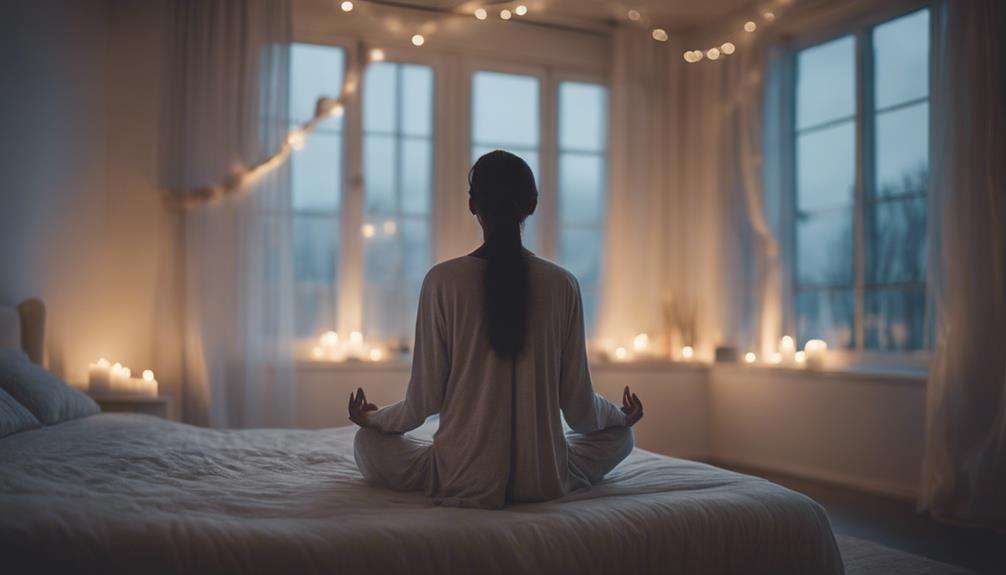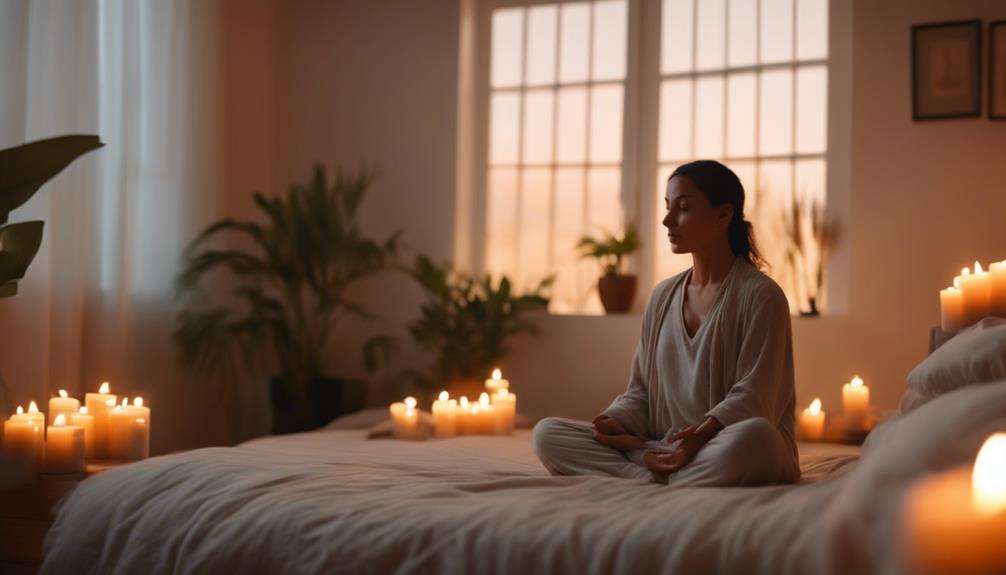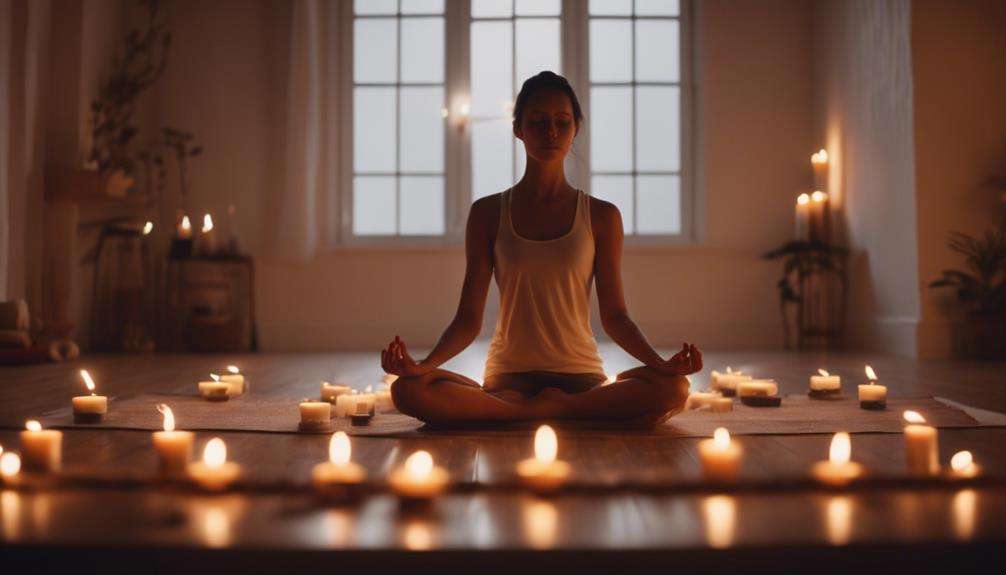If you've ever struggled to get a good night's sleep, mastering these three meditation techniques can be a game-changer for your restful nights. Imagine being able to effortlessly drift off into a deep and rejuvenating slumber, waking up feeling refreshed and ready to tackle the day.
By incorporating these practices into your nightly routine, you can transform your sleep quality and overall well-being. But how exactly can mindfulness, guided, and body scan meditations work their magic on your sleep patterns? Let's explore together.
Key Takeaways
- Mindfulness, guided, and body scan meditations enhance sleep quality and promote relaxation.
- Meditation techniques aid in reducing stress, improving focus, and preparing the mind and body for restorative sleep.
- Incorporating meditation into bedtime routines can transform sleep patterns and overall well-being.
- Guided meditation offers structure and support, benefiting beginners and promoting better sleep outcomes.
Mindfulness Meditation Technique
If you struggle with sleep disturbances, incorporating the mindfulness meditation technique into your bedtime routine can significantly improve the quality of your rest. Mindfulness meditation focuses on present awareness, allowing you to observe your thoughts without judgment. By practicing this technique, you promote relaxation and calmness, which are essential for preparing your mind and body for restorative sleep.
Studies have shown that mindfulness meditation can be particularly beneficial for older adults experiencing sleep disturbances. This practice not only reduces stress but also enhances sleep quality by helping individuals regulate their breathing patterns. Additionally, mindfulness meditation plays a crucial role in cognitive behavioral therapy for insomnia, emphasizing the importance of self-regulation in achieving better sleep outcomes.
Guided Meditation Technique
To enhance your sleep quality and promote relaxation, consider incorporating the guided meditation technique into your bedtime routine. Guided meditation involves following a meditation leader's instructions, often through recordings, to facilitate deep breathing, focus, and relaxation. This technique aids in sleep induction by guiding the mind into a state of calmness, making it easier to drift off to sleep. By listening to the guide's voice and practicing deep breathing, you can reduce anxiety and prepare your mind and body for restorative sleep.
Guided meditation is particularly beneficial for beginners as it provides structure and support throughout the meditation process. Research indicates that incorporating guided meditation into your nightly routine can improve sleep quality and contribute to overall well-being. So, if you're looking to enhance your sleep experience and reduce stress levels, guided meditation could be a valuable addition to your bedtime rituals.
Body Scan Meditation Technique

When practicing the body scan meditation technique, focus on sequentially tuning into different body parts to increase awareness and promote relaxation. This method aids in releasing tension and stress by honing in on physical sensations throughout your body.
By systematically relaxing each body part, body scan meditation cultivates mindfulness and fosters deep relaxation, leading to better sleep quality. Engaging in body scan meditation can effectively enhance your ability to unwind before bedtime, potentially improving your overall sleep experience.
Regular practice of this technique can help you become more in tune with your body, allowing for increased relaxation and better sleep outcomes. By dedicating time to body scan meditation, you can experience heightened awareness, tension release, and a sense of calmness, all contributing to a more restful night's sleep.
Frequently Asked Questions
What Meditation Is Best for Sleep?
For improving sleep, mindfulness practices, guided visualizations, relaxation techniques, body scanning, breathing exercises, mantra meditation, progressive muscle relaxation, loving kindness meditation, gratitude meditation, and yoga nidra are beneficial. Choose techniques that resonate with you for better rest.
Can Meditation Be as Restful as Sleep?
You can achieve a restful state through meditation, similar to sleep. Meditation's benefits on sleep quality, mind-body connection, and relaxation techniques can help alleviate sleep disturbances, reduce stress, and improve sleep hygiene, offering rejuvenation like sleep.
How Do You Meditate for Deep Sleep?
To meditate for deep sleep, start by focusing on mindful breathing. Practice body scan and guided visualization. Engage in progressive relaxation techniques. Incorporate loving kindness, yoga nidra, and chakra balancing for deep relaxation. Use mantra meditation to calm the mind and promote a tranquil state.
How to Induce Sleep With Meditation?
To induce sleep with meditation, start with calming breathing exercises. Practice guided visualization, progressive relaxation, and body scan. Engage in mindfulness, mantra meditation, and yoga nidra. Incorporate sleep music, aromatherapy oils, and sleep hygiene practices for restful nights.
Conclusion
In conclusion, incorporating mindfulness, guided, and body scan meditation techniques into your bedtime routine can greatly improve your sleep quality.
While some may doubt the effectiveness of meditation for sleep, numerous studies have shown its benefits in reducing stress and promoting relaxation.
Give these techniques a try and experience the restful sleep you deserve. Sweet dreams await!






